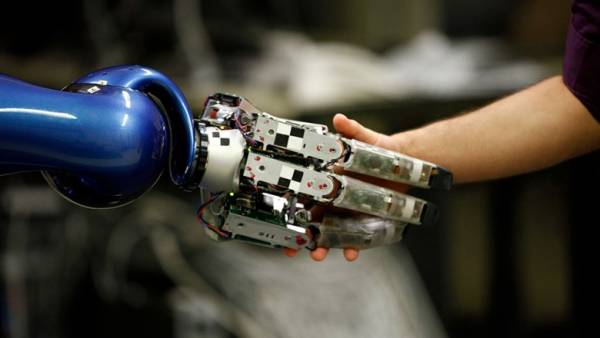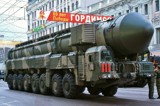Machine “Kalashnikov”
Russia to oppose the ban of fully Autonomous combat systems.

As it became known “Kommersant”, Russia is ready to support the proposal of France and Germany on the adoption of the UN political Declaration, which would state the importance of maintaining human control of Autonomous weapons systems. This initiative in late August in Geneva to discuss representatives from more than 80 countries and international organizations. Meanwhile, as explained to “Kommersant”, the Russian foreign Ministry, Moscow is strongly opposed to the introduction of legally binding restrictions in the sector as a full-fledged artificial intelligence does not yet exist. Supporters of the ban “killer robots”, however, warn that technology is evolving so quickly that diplomats may not be able to prevent a catastrophe. “B” versed in the intricacies of the new directions the world of diplomacy.
Keep the human control
From 27 to 31 August in Geneva, under the auspices of the UN negotiations of the Group of governmental experts on lethal Autonomous weapons systems (saws). This topic diplomats began to discuss recently: the first such meeting was held in December 2017, the second — in April 2018. As the discussion platform was chosen as the format of the inhumane weapons Convention. In its framework at the time was born bans cluster munitions, Napalm, blinding lasers and anti-personnel mines.
The initiative to prohibit the SAS were made by several States. Among them, for example, Austria, Argentina, Brazil, Bolivia and the Vatican. Just at the moment the idea of banning support 26 countries.
The logic of the initiators of radical measures is that artificial intelligence technology is rapidly developing, and the emergence of fully Autonomous machines, able to make decisions and act without control on the part of man, is not far off.
Governments invest heavily in the adaptation of these technologies for military use and armed with a number of countries are already systems with elements of artificial intelligence (from the integration of air defense systems to “swarms” of drones that can attack “swarm” of robotic sentries and apparatus for neutralizing explosive devices); so, in five to ten years the world may face with the introduction of battlefield killer robots, which will be expected to choose targets and attack them.News Unmanned killer and flamethrower. As drones become household weapons
Unmanned killer and flamethrower. As drones become household weapons
Hence the demand to ban fully Autonomous lethal systems: its initiators insist on the adoption of a legally binding international Treaty that would require States to ensure the preservation of adequate human control over machines. As explained to “Kommersant”, the coordinator of the global campaign “Stop killer robots” (Stop Killer Robots) Mary Verham, under “adequate control” means the possibility of operator intervention in the process of selecting targets and carrying out attacks.
The supporters of this idea, a large public support. Published by the American organization “the Institute for the future of life” (Future of Life Institute) July 18, a petition to ban the creation of fully Autonomous combat robots have already signed nearly 2.5 thousand scientists, engineers, public figures and representatives of the IT business. Some success by supporters of radical measures has been achieved. So, until December 2017 the subject of CAC in Geneva for three years was discussed informally. However, at the end of last year, 123 States have officially approved the idea to give the group a discussion mandate. The initiators of the ban Autonomous military robots hope is scheduled for a late August meeting will be a step towards giving the group a full-fledged negotiation format, i.e. it will open the way to elaborate a Convention on the prohibition of the SAS.
Speculative system
However, many countries are skeptical about the idea of banning such systems. Among them Russia. Her delegation (composed of representatives of the Ministry of foreign Affairs, the Ministry of defense and Ministry of industry and trade), and even prepares to leave to Geneva, but severe restriction or total prohibition of the SAS say it is not ready, and therefore opposed to allowing a Group of governmental experts negotiating mandate. As explained “Kommersant” in the Russian foreign Ministry, this “cautious” attitude “associated with a number of circumstances.”
“First, we must remember that we are talking about technology, not having yet really active samples. The idea of such systems, there is only a very superficial and speculative, — remind in the Ministry.— Serious difficulties are observed even in the development of a production version of the definition of CAC”.The news is not unique. Russia has shown the latest weapons
is not unique. Russia has shown the latest weapons
Secondly, the foreign Ministry indicated “difficulties with a clear distinction between civil and military developments in the field of Autonomous systems.” And thirdly, the Ministry “there are considerable doubts as denoted by radical States and non-governmental organizations, insufficiency of the existing international legal framework for the regulation of the SAS”. “In our view, international law (including humanitarian industry) is fully applicable to SAS and not in need of modernization or adaptation to such not yet existing weapons systems”, — assured on the Smolensk square. And added: “Russia strictly adheres to the norms of international humanitarian law applicable to this promising type of weapons. The Russian national legislation contains provisions that places a barrier to the possible commissioning of weapons that do not meet the international legal obligations of Russia”.
Note that the Russian military is actively adapting the elements of artificial intelligence for their own purposes. On the Russian armed forces are robotic marine systems “Quirk” that can after getting the job independently analyze the situation and choose the ways of its solution.
Member of the Board of the military-industrial Commission of Russia Oleg Martyanov said the Agency “Interfax” that from 2017 engaged in the search for unexploded ordnance and protection of the water area near the Syrian port of Tartus. It was also reported about the availability of the electronic warfare troops of the armed forces of the system RB-109A Bylina, able to analyze a combat situation and choose the ways of suppression of the signals of the enemy.
15фотографий15фотографий15фотографийэлементами artificial intelligence plan to give almost all the latest Russian weapons systems — from cruise missiles to tanks and fighters. Russian President Vladimir Putin in September last year said that the country has achieved leadership in creating artificial intelligence, “will be master of the world”.
In the meantime, Russia in this sphere is inferior to the US and China. In General, according to analysts of the American research company MarketsandMarkets, the global market of technologies of artificial intelligence for military purposes in 2017 amounted to $6,26 billion Experts believe that by 2025 this figure will rise to $18,82 billion Among the leading companies in the global market in the first three positions are occupied by the giants of the American military-industrial complex: Lockheed Martin, Raytheon and Northrop Grumman.
In this regard, it is not surprising that the US authorities are not ready to discuss a moratorium on the creation of Autonomous fighting robots. The same position is shared by other countries that actively invest in innovative weapons: Britain, France, Germany, Israel, Japan, South Korea. The only member state of the UN Security Council, supported the elaboration of a Convention on the prohibition of the SAS, suddenly became in April of this year, China. However, in Beijing a reservation: speech can go only about the prohibition of the use of fully Autonomous combat systems, but not about limitations to their design and creation.
News of the Army of the future and the transformation of military technology. Trends and forecasts of experts
of the Army of the future and the transformation of military technology. Trends and forecasts of experts
Anyway, given the unwillingness of the leading countries to discuss any of the prohibitions in this sphere of supporters of radical measures can hardly hope for rapid progress. A compromise would be to offer France and Germany, which is expected to be considered at the session in Geneva. Paris and Berlin propose to make a political statement in which the country would guarantee that people in any case will play a key role in the activation of the Autonomous combat systems and will be able to maintain control over their actions.
The Russian foreign Ministry “Kommersant” said that Moscow has no objection to beginning training at the site of the Convention on certain conventional weapons political Declaration on the CAC, with the understanding that it will be agreed following the results of work of the specialized Group of governmental experts. The Ministry stressed that the actions of the Russian delegation will depend on the “specific content” of the Declaration and on whether the document takes into account the position of Russia. Russian negotiators promised to “Kommersant”, the Russian foreign Ministry, ready to “engage in work” on drafting the text and generally believe that its adoption would be “a useful result” of the activities of the Group of governmental experts.
As follows from an interview with Mary Verham, supporters of a ban of killer robots this measure will not satisfy. But more of them at the moment can not count.
Elena Chernenko
6фотографий6фотографий
See also:
- “Mace”: what is known about a secret weapon, which is afraid of the world
- In the Network leaked information about the latest Russian weapons (photo)
- Elon Musk and 115 other experts are asking the UN to ban killer robots